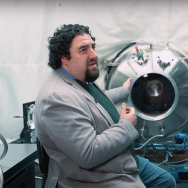Bryan Johnson is determined to explore the depths of your mind and help save humanity from its direst threats.
“The biggest revolutions that have happened over the past couple of decades have largely been done on silicon—the transistors we build, the computers we have, the internet, our smartphones,” said Johnson, MBA’07. “The next great revolutions will be evolving our cognition and predictably engineering atoms, molecules, organisms and complex systems.”
Since his time as a University of Chicago Booth School of Business student, Johnson has a track record of recognizing coming revolutions. In 2013, having sensed the seismic changes wrought by technology in e-commerce, Johnson sold his credit-card payments processing company Braintree to PayPal for $800 million. He had a world of opportunity at his feet. “How can I help humanity thrive?” was the question that dominated his thoughts. “I spoke to hundreds of people and read extensively to try and find the highest leverage points.”
Johnson invested $200 million in two bold ventures he believes answer that question: OS Fund and Kernel. With $100 million, he established OS Fund, a VC fund solely focused on deep tech and scientist-entrepreneurs whom Johnson characterizes as “rewriting the operating systems of life.” In their work he sees world-changing promise to address climate change, advance human health, and tackle other urgent challenges facing mankind. With a further $100 million of his own money, Johnson founded Kernel, a brain-interface startup aiming, in the words of WIRED magazine, to “create a better human.” Kernel is building a noninvasive “mind, body, machine interface” to radically improve and evolve human cognition.
But Johnson firmly believes he can bring his vision to life. So do others.
“Bryan is one of those rare geniuses that sees things other people don’t see and has the ability to make them happen,” said Waverly Deutsch, clinical professor at the University of Chicago Booth School of Business. Deutsch helped coach Johnson and Braintree to first place in the 2007 Edward L. Kaplan, ’71, New Venture Challenge at the Polsky Center, when he was an Executive MBA student. Deutsch added: “It’s the combination of not only being able to see the future that you want to create, but also being able to bring people into that vision to create it with you.”
A simple plan
At the age of 21, he came up with a straightforward plan: start a successful business, become a billionaire by 30, and use that money to help others. “In my 21-year-old mind that made sense,” Johnson said.
He embarked on a string of ventures that included “one small success and two big failures” that left him heavily in debt. Desperate, he took a gig selling credit-card processing services door-to-door to small businesses. A year later, as he was breaking sales records, he saw software-based businesses struggling with online payments. A thought struck him: “I wondered: Is there a business here?”
After earning a bachelor’s degree in international studies from Brigham Young University in 2003, Johnson found himself reading The Economics of Life, a collection of forward-looking essays by pioneering UChicago scholar Gary S. Becker.
“He framed the world quantitatively,” Johnson said of the Nobel laureate. “I had grown up in a religious community, where certainty was created by faith and scripture, not through numbers and models and mathematics. I became infatuated with the idea that you could quantitatively understand the world.”
Inspired by Becker, and with the idea for Braintree kicking around in his head, he moved to Chicago and enrolled in Booth’s Executive MBA Program—becoming one of the youngest students admitted, in his mid-20s.
One day, Deutsch visited their class to pitch Booth’s top-ranked business accelerator, the New Venture Challenge. Johnson signed up, and Deutsch coached his Braintree team. For the first time, this lone-wolf founder had a network of support.
“I’d never had the benefit of having seasoned people around me to help me mature as an entrepreneur,” Johnson said. “I found it to be immensely helpful to think out loud and work with them on how to build Braintree.”
When Braintree took first place in the 2007 NVC, Johnson had the chance to chase his grand vision.
Rolling up his sleeves
The timing couldn’t have been better: Though payments processing was a crowded industry, it wasn’t one that was known for innovative software or exemplary customer service. Around the same time, new tech startups such as Uber, Airbnb and Shopify—all future Braintree customers—were emerging, all needing new digital payment capabilities.
That was no small feat—to allow its customers to accept user payments 24/7, Braintree’s own systems could never be down for maintenance. Johnson even tagged along once on an overnight trip to a data center, pitching in alongside his engineers to check logs and calling a customer to troubleshoot.
By 2011 Braintree was growing rapidly. The company was processing $8 million in payments every day, and Inc. magazine ranked it among the fastest-growing private companies in the United States. Two years later, in 2013, PayPal acquired the company for $800 million.
Johnson suddenly found himself fulfilling that wildly ambitious dream he had as a 21-year-old. His focus turned back to his early promise to himself: that he would do good for humanity if he had the chance.
“My objective was to do something that would matter in 500 years,” he said. “The sooner I could get started on that, the better.”
A new quest
Intent on making the largest possible impact, he gravitated to deep tech and the kinds of futuristic scientific breakthroughs that, if successful, would result in quantum leaps forward for humanity.
He saw two clashing trends: First, new advances were rapidly decreasing the cost and time associated with doing science. Take, for example, the price to sequence a human genome—the first effort took $2.7 billion and 13 years, but by 2016 it could be done for less than $1,000, according to the US National Human Genome Research Institute.
Suddenly, an entrepreneur in biology or chemistry or genetics could get to market in a matter of years instead of a decade, with far less capital. “It became very apparent to me that this was the next revolution that was going to change the world,” Johnson said.
Second, traditional sources of funding from the government and research institutions were being squeezed. Venture capitalists were loath to step up, still considering scientific investments to be too long, too expensive, and too risky, hinging on a binary outcome of success or failure.
Ever the contrarian, Johnson founded OS Fund with a bold declaration: It’s not only critical for the future of the planet that we invest in these breakthroughs; it’s possible to do so profitably.
The fund is already proving the naysayers wrong. The technologies among the 28 portfolio companies in OS Fund I might seem like the stuff of science fiction: engineering yeast to make custom-designed bacteria for probiotics that can treat antibiotic-resistant germs; storing data on DNA; programming new molecules, atom by atom, like they are LEGO bricks. And yet, the fund performed in the top decile of U.S. firms last year, with 27 of the 28 investments receiving follow-on funding. Two of the companies have been acquired. Three companies are valued at over $1 billion.
Monsters Inc.
While OS Fund supports ventures that largely look to solve threats to humanity with solutions from outside the human body, Johnson’s neuroscience technology company Kernel looks at addressing threats that imperil humans from the inside. Johnson has characterized these perils—diseases such as Alzheimer’s, epilepsy, depression—as “monsters.”
“When my daughter was seven years old, she told me that she was concerned about a lot of things in life,” he recalled. He asked her what she worried about. Her list included concerns such as animals taking over the world and the recently deceased family snake coming back to life. At the top of the list: monsters. “To relate with her,” he said, “I told her that I too was worried about monsters. Not the ones underneath the bed, but the ones inside my head.”
Johnson openly shares his own struggles with chronic depression, which lasted for about a decade. He has watched family members suffer from addiction and Alzheimer’s disease. He hopes Kernel can address these kinds of neurological diseases and dysfunctions. But also, he hopes Kernel’s technology can illuminate our own cognitive biases and extend the very limits of the human brain.
“Humanity is remarkably resilient, and I would not bet against our collective tenaciousness and ingenuity,” Johnson said. “Investing in these companies and seeing what is really going on in the trenches of the future gives me tremendous hope that the technologies we need to solve our problems will, in fact, be online when we need them.”
In OS Fund and Kernel—indeed all the opportunities Johnson envisions to help humanity thrive—have a common thread. To find solutions for health crises, climate change, really any challenge facing humanity, it all starts with the brain.
“Our brains are the master tool,” Johnson said. “Everything is downstream from our minds. We can evolve ourselves into an existence that is more remarkable than any of us can even remotely imagine.”
—Adapted from a story that first appeared in Chicago Booth Magazine. Read it in its entirety here.

